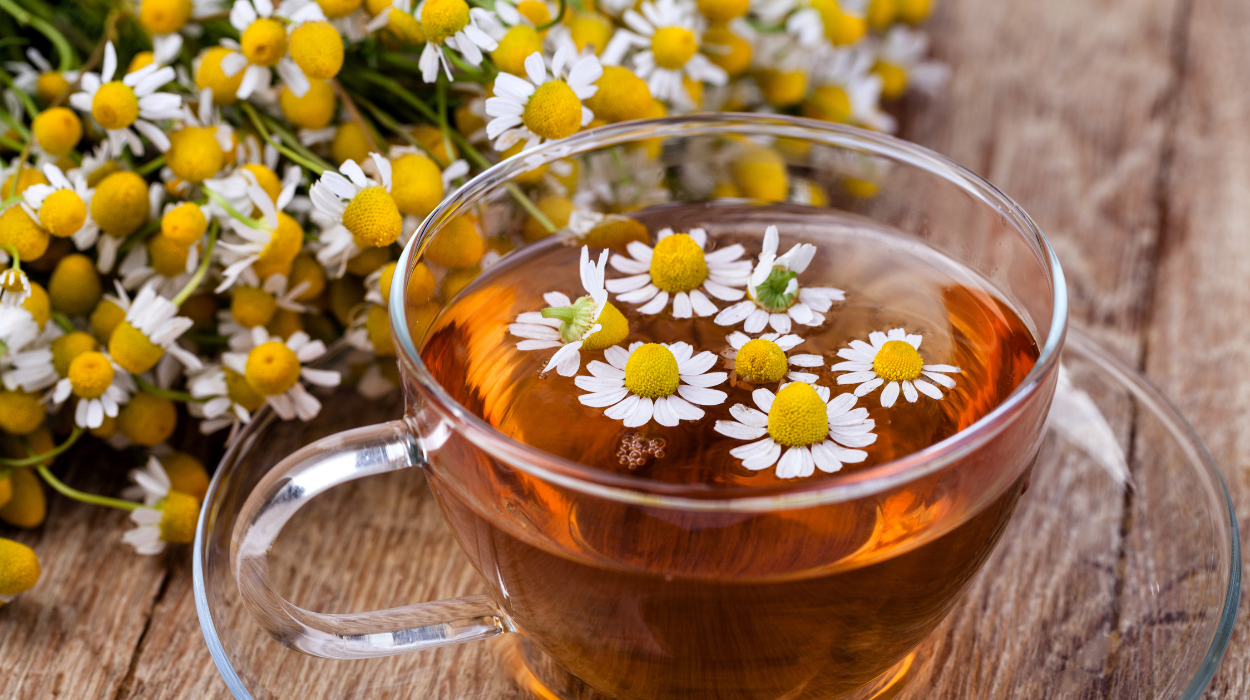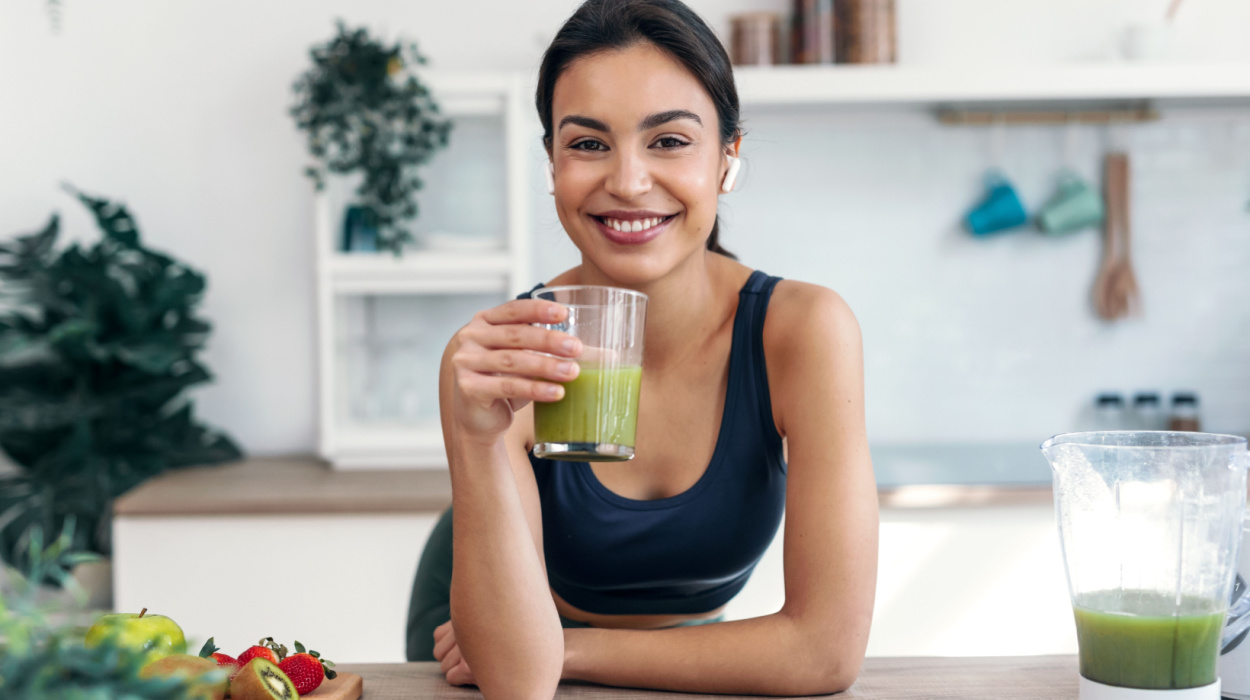We’re all aware that sustainable weight loss[1] is best achieved through a balanced diet, regular exercise, less stress, and adequate sleep. But have you ever taken a minute to consider the impact of the beverages you consume?
Beverages contain calories that contribute to your daily energy intake. This means that whatever you drink will either help or hinder your path to a lower number on the scale.
If you’re wondering “Which is the best drink for weight loss,” you’re in the right place. From detoxifying teas to protein shake supplements, what you have in your glass can tip the scales in your favor. Let’s explore the 12 best weight-loss drinks to try in 2024.
12 Best Drinks For Weight Loss To Try
The 12 best drinks for weight loss include:
- Water.
- Green tea.
- Coffee.
- Herbal teas.
- Apple cider vinegar.
- Ginger drinks.
- Vegetable juices.
- Fruit smoothies.
- Lemon water.
- Coconut water.
- Protein shakes.
- Kombucha.
12 Best Weight Loss Drinks To Try At Home
Sugary and caloric beverages such as sodas, artificial fruit juices, and milkshakes increase your calorie and carbohydrate intake. Loaded with added sugars and excess fat, these contribute empty calories[2] that hinder your weight loss.
Here are 12 drinks you take without worrying about weight gain:
Water

While it may seem obvious, staying hydrated is vital for weight loss. Here’s why water[3] is at the top of our list:
- Suppresses appetite: Dehydration can mimic hunger pangs, leading to unnecessary eating. Water fills you up without the calories, curbing cravings and helping you manage portions. In a study on the effect of water intake on weight loss participants were advised to drink up to 1.5 l a day. They consumed up to 500ml of water during breakfast, lunch, and dinner. The results showed that water suppresses appetite,[4] contributing to weight reduction over time. Water intake is being proposed as a weight loss intervention for obese patients.
- Eliminates toxins: Water works with your liver and kidneys as e a natural detoxifier, flushing out waste products.
- Digestive dynamo: Proper hydration keeps your digestive system running smoothly, promoting nutrient absorption and preventing constipation.
Tip: Aim for 6-8 glasses of water per day[5] for overall health.
Green Tea
Green tea is hailed for its weight loss benefits due to its rich content of catechins, particularly epigallocatechin gallate, EGCG. This compound is a powerful antioxidant that has been found to stimulate metabolism[6] by increasing the rate at which the body burns calories and fat.
EGCG has also been found to enhance thermogenesis,[7] the process of generating heat. Elevated thermogenic activity leads to increased calorie burning, which contributes to fat loss over time.
Additionally, green tea has been shown to improve the body’s sensitivity to insulin.[6] This helps regulate blood sugar levels, potentially reducing fat storage. This tea also inhibits the secretion of ghrelin, which helps curb cravings.[8]
Tip: Enjoy green tea hot or cold, plain, with lemon, or with a sprig of mint. For extra flavor, experiment with matcha or try flavored green teas.
Coffee
Research shows that drinking coffee may help reduce body weight thanks to its high caffeine content. A 2019 paper on the effect of regular coffee intake on obesity found that coffee was associated with lower body fat levels,[9] particularly in men.
Here’s how it works:
- Boosts metabolism: Caffeine increases the rate at which your body burns fat.[10] This results in a small but consistent calorie deficit over time. This is why caffeine is added to many fat-burning supplements.
- Suppresses appetite: Coffee is believed to suppress appetite[11] for a short time, leading to fewer calories consumed throughout the day.
- Fat mobilization: Studies suggest caffeine may help mobilize fatty acids from fat tissue,[12] making it easier for your body to burn. It stimulates the release of epinephrine, which can help break down fat stores and make them available for use during physical activity.
- Increased exercise performance: Research indicates that taking caffeine before exercising[13] increases fat burning during cardio and anaerobic exercise. This type of exercise doesn’t rely on oxygen for energy production but rather on energy sources within the muscles. This is because caffeine can enhance your energy and focus, potentially leading to more intense and longer workouts.
Tip: Skip the sugary lattes and stick to black coffee, or add a splash of unsweetened milk to keep it calorie-friendly.
Herbal Teas

Herbal teas, known for their diverse flavors and medicinal properties, can be instrumental in weight loss. They function as drinks that speed up your metabolism, among other health benefits. Check out these viable options:
- Dandelion tea: A natural diuretic that promotes elimination of excess water.[14] Reduced bloating contributes to initial weight loss, which supports a leaner appearance.
- Peppermint tea: Aids digestion[15] by relaxing the muscles of the gastrointestinal tract, which minimizes bloating and indigestion. Disrupted digestion[16] can trigger gastrointestinal conditions like gastroesophageal reflux disease and poor gut microbiota, which are linked to weight gain.
- Hibiscus tea: Hibiscus tea inhibits the activity of amylase,[17] an enzyme that breaks down carbohydrates. This results in decreased absorption of carbohydrates, contributing to weight loss. It is also rich in antioxidants, which combat imbalances between harmful molecules like free radicals and inflammation.
- Chamomile tea: Stress increases the secretion of cortisol,[18] which instigates weight gain, particularly around the abdominal area. Chamomile tea, known for its calming properties, may promote stress reduction,[19] indirectly supporting weight loss efforts.
- Turmeric tea: Curcumin,[20] the active compound in turmeric, has anti-inflammatory properties and may contribute to weight loss by reducing inflammation and improving insulin sensitivity.
Tip: Drink teas without sugar and enjoy them hot or cold.
Apple Cider Vinegar
Apple cider vinegar, ACV, may aid weight loss by promoting satiety, thus reducing overall calorie intake. The acetic acid in ACV influences the appetite center in the brain, leading to appetite suppression.[21] More studies are needed to determine if these effects are long-term.
Some studies suggest that ACV may enhance metabolism, which explains its use in the management of metabolic abnormalities[22] that may cause weight gain.
Tip: Consume ACV diluted in water. Add honey or lemon to taste.
Ginger Drinks
Ginger[23] brings a spicy punch to your weight loss journey in several ways:
- Boosts metabolism: Ginger contains compounds that increase your body’s heat production, leading to fat burn.
- Balances blood sugar: Ginger may help regulate blood sugar levels, preventing crashes that heighten cravings.
- Anti-inflammatory power: Ginger has anti-inflammatory properties, which benefit metabolism and weight management.
- Improves digestion: Studies show that ginger is effective in relieving symptoms of indigestion.[24] Tip: Grate ginger in hot water or simmer it for a few minutes, then strain and enjoy. You can also add a squeeze of lemon or honey for taste.
Vegetable Juice
Packed with essential vitamins, minerals, and fiber, vegetable juices support overall health while helping to control calorie intake. The fiber promotes satiety,[25] reducing the likelihood of overeating. The combination of nutrients in vegetable juices also supports metabolism[26] and provides the body with essential elements for optimal functioning.
Tip: Choose ingredients like spinach, kale, and celery to enhance antioxidant intake. Remember that not all vegetable juices are high in fiber, such as cucumber juice. Be mindful when using high-sugar vegetables like beets and carrots to reduce calorie intake.
Fruit Smoothies
Similar to fruit salad, fruit smoothies[27] support weight loss by offering a nutrient-packed, satisfying option. When blended with low-sugar fruits, vegetables, and protein sources like yogurt or skim milk, they create a filling drink that curbs hunger and reduces overall calorie intake.
The fiber content contributes to a sense of fullness. Additionally, the combination of vitamins, minerals, and antioxidants supports overall health and metabolism.
Tip: Avoid adding sugar and artificial sweeteners to your smoothies.
Lemon Water
Lemon water is one of the simplest weight-loss drinks to make at home. The vitamin C in lemons supports metabolism,[28] enhancing calorie-burning. Additionally, the hydration provided by lemon water contributes to a feeling of satiety, preventing overconsumption of calories.
Tip: Add a slice or squeeze the lemon juice into hot or cold water.
Coconut Water
Coconut water provides a hydrating option with few calories, making it a suitable choice for those trying to manage their weight. This is because the natural weight loss drink:
- Is low in calories and sugar: Compared to sugary drinks, coconut water boasts a mere 21 kcal and about 6 grams of natural sugar.[29] This makes it a guilt-free swap for sodas and juices, avoiding calorie overload that hinders weight loss.
- Promotes hydration: Staying adequately hydrated is essential for overall health and metabolism. Coconut water, rich in electrolytes[30] like potassium and magnesium, effectively replenishes fluids, preventing dehydration which can mimic hunger. Taking coconut water post-exercise will provide the same effects as drinking a sports drink.
- Boosts metabolism: Studies suggest coconut water may increase metabolism due to its medium-chain triglycerides[31] and MCTs. MCTs are fat that the body breaks down more readily for energy.
- Increases satiety: Coconut water’s natural sweetness and slightly fibrous content offer a prolonged feeling of fullness,[32] reducing cravings and unhealthy snacking.
- Supports healthy eating: Replacing sugary drinks with coconut water allows you to consume fewer empty calories. This makes room for nutrient-dense foods that contribute to sustained weight management.
Tip: You can drink coconut water plain or mix it with other fruit juices. Just be mindful of the sugar content.
Protein Shakes
Ever wondered why athletes and gym rats say a protein shake is the best drink for weight loss and muscle gain? Here’s why:
- Builds and preserves muscle: With weight loss, you risk losing lean muscle along with fat. Fortunately, the high protein content in supplements helps build muscle mass.[33] This increases your metabolism, leading to more calories burned throughout the day, even at rest.
- Curbs cravings: Protein keeps you satiated for longer. This suppresses cravings and helps control calorie intake.[34]
- Supports metabolism: Protein’s thermogenic effect[35] also increases caloric expenditure during digestion.
- Make convenient meal replacements: Protein shakes are a quick and easy meal replacement or post-workout snack, ensuring you meet your protein needs without time-consuming meals.
Tip: The best protein shakes for weight loss are plant-based or whey protein powders.[36] This is because they are both low in calories, high in protein, and help maintain muscle mass while promoting a feeling of fullness.
Kombucha
While research on kombucha‘s[37] weight-loss effects is ongoing, its potential to support digestion, boost metabolism, and provide a low-calorie beverage makes it a healthy choice. Rich in probiotics, it supports gut health, promoting a balanced microbiome linked to weight regulation.
The acetic acid it contains may enhance metabolism and act as a fat burner, potentially contributing to weight loss. Additionally, kombucha is low in calories, offering a satisfying, flavorful alternative to sugary drinks.
Worst Drinks For Weight Loss
While we’ve explored some great drinks for weight loss, it’s important to know which ones to avoid. They include
- Fizzy drinks like soda and even diet soda.[38]
- Fruit juice with added sugar.
- Whole milk.
- Alcoholic beverages.
- Sugar-sweetened beverages and fat-laden drinks like coffee with whipped cream, commercial smoothies, and creamy milkshakes.
- High-calorie protein shakes.
- Energy and sports drinks for non-athletes.
Other Tips To Lose Weight Safely
Losing weight sustainably requires a holistic approach that prioritizes both physical and mental well-being. Here are some tips to guide your weight loss journey:
Healthy Diet
- Focus on whole foods.
- Limit processed foods.
- Stay hydrated.
- Plan your meals.
- Control portion sizes.
- Practice mindful eating.
- Track your progress.
Regular Exercise
- Aim for at least 150 minutes[39] of moderate-intensity exercise per week.
- Incorporate strength training.
- Find an activity you enjoy.
- Start slow: Don’t push yourself too hard, especially if you’re new to workouts.
- Listen to your body.
Lifestyle Interventions
- Get enough sleep: Aim for at least seven hours of sleep per night.[40]
- Manage stress.
- Seek support.
- Seek professional guidance.
Final Thoughts
There you have it — the 12 best drinks to lose weight that you can try at home. From the metabolism-boosting powers of green tea to the refreshing simplicity of lemon water, these beverages offer a flavorful and waistline-conscious approach to liquid nourishment.
Remember to combine your healthy drinks with a healthy diet and regular exercise for long-term weight loss and management. Also, consult a healthcare provider or registered dietitian for guidance when losing weight.
Frequently Asked Questions
Yes, certain drinks like green tea and water can aid weight loss by boosting metabolism and promoting fullness.
Opt for water, herbal tea, or a smoothie with ingredients like fruits, vegetables, and a protein source.
Green tea is known for its metabolism-boosting properties, thanks to catechins like EGCG, which promote weight loss and calorie expenditure.
Drinks like green tea, lemon water, and ginger tea may aid in burning belly fat. However, overall lifestyle factors, including diet and exercise, are necessary for effective results.
 Evidence Based
Evidence Based
